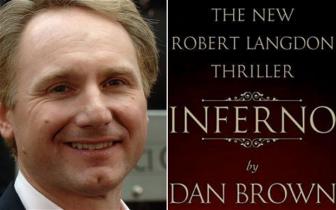I am an avid reader of Dan Brown books. I loved reading "Angels and Demons". His book "The Davinci Code" motivated me to learn more about the three major monotheist religions from a historical point of view.
I was anticipating the publication of "The Lost Symbol" book. The book came after a three-years delay and it was such a disappointment. I had the impression that Daniel Brown was writing his book for Holywood and not for his readers. I said to myself, Brown is dead as an author and he will never dare to publish a book again. A passing fashion.
Though, a few weeks ago, I was surprised to see a big announcement at the front of Indigo book store in Montreal about an upcoming book by Dan Brown. A couple of weeks later, the book was on sale with a rebate of 40%, so I took the bait.
The starts with Symbiologist Robert Langdon finding himself lying in a hospital room in Florence, Italy, with no collection of what has brought him there. A few minitues later a girl with spiky hair and riding a BMW motobike was trying to kill him. As usual, Langdon partened with a smart female, though not as smart as him, Miss Sienna Brooks. In short, the prestigious Harvard professor found himself in a messy situation and he could not remember what led him to the mess. Just like the actors of movie hangover. It makes you wonder Dan Brown's inspiration sources.
The story is about a genius Biologist, a hard believer in Transhumanism and an admirer of the italian poet Dante who set his mind to save humanity from over population by exterminating a portion of it, or so it seemed. The biologist committed suicide and in his kindness he left a series of clues that would lead to nullifying his plans. The usual 24h chase then begins. A chase that takes place in three cities Florence, Venice and Istanbul. Here are my impressions in bullet form:
* Dan Brown's style is tedious to read. He kept using some fancy words over and over again. At the end, he gave me the impression that he was like a high-school student graving to get a higher grade by using fancy words and with no real substance behind.
* Brown kept describing monuments in very boring details. I was image-googling all the monuments he mentioned, so most of his descriptions were worthless. I had the impression that he was just trying to fill in pages with words. It was like reading poorly-written excerpts from Wikipedia. I started skipping paragraphs, then whole pages.
* Brown was arrogant in some chapters. Like when Langdon was surprised how many authors attended his lecture and then thinking either he had the most prestigious audience or that the e-publishing business is picking up.
* Bad taste jokes when Langdon's editor complained that he was not making much money from his book and that he should probably write a book called "Fifty Shades of Iconography". I did not read "Fifty Shades of Gray", though I would safely classify Brown books in the same category as "Fifty Shades of Gray": popular books.
* Unjustified use of curently-popular technologies. For instance, a group of well trained soldiers get into Sienna Brooks appartment, but they miss of course Langdon and Brooks. These soldiers decide then to use a single drone to chase Langdon. They found Langdon's jacket in Brook's flat, so they could have used dogs instead which would have been much more efficient that this lone drone. But, oh no, Mr Brown prefers hi-tech that speaks to the masses.
* Naive situations, like the genius biologist looking impressed to the head of the International Health Organization after she managed to answer a question involving geometric progressions that any high-school student could solve in seconds.
* Naive claims, like when the genius biologist descided that his sterility gene will randomly go active with a probability of 1/3. Such ratio seems to be the magic number that plague and other mass deseases have found to save the world from over-population. Though, and as this sterility gene is inherited, Brown does not tell us if this probability needs to be lowered from one generation to the next in order to avoid human extinction.
Inferno has a single twist that saves it from being a poor book and promotes it to the above-average rank. It is a page-turner, but after finishing it, you feel that you have been cheated by the author.

